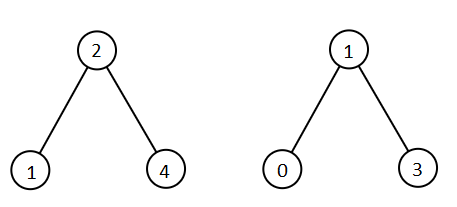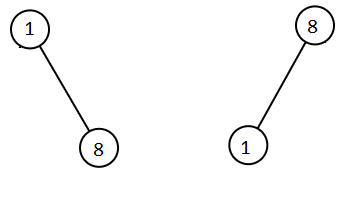Given two binary search trees root1 and root2.
Return a list containing all the integers from both trees sorted in ascending order.
Example 1:

Input: root1 = [2,1,4], root2 = [1,0,3] Output: [0,1,1,2,3,4]
Example 2:
Input: root1 = [0,-10,10], root2 = [5,1,7,0,2] Output: [-10,0,0,1,2,5,7,10]
Example 3:
Input: root1 = [], root2 = [5,1,7,0,2] Output: [0,1,2,5,7]
Example 4:
Input: root1 = [0,-10,10], root2 = [] Output: [-10,0,10]
Example 5:

Input: root1 = [1,null,8], root2 = [8,1] Output: [1,1,8,8]
Constraints:
- Each tree has at most
5000nodes. - Each node's value is between
[-10^5, 10^5].
题目大意:给定两颗二叉搜索树,返回一个升序的列表,列表中的元素是两棵树的节点值。
思路:二叉搜索树的中序遍历是非减的序列,因此可以先对两个二叉搜索树进行中序遍历得到两个非减序列,再合并两个序列。
1 class Solution { 2 //中序遍历并保存 3 void traverse(TreeNode *root, vector<int> &v){ 4 if (root == nullptr) 5 return; 6 traverse(root->left, v); 7 v.push_back(root->val); 8 traverse(root->right, v); 9 } 10 //合并两个vector 11 vector<int> merge(vector<int> v1, vector<int> v2) { 12 vector<int> v(v1.size()+v2.size()); 13 int i = 0, j = 0, index = 0; 14 while (i < v1.size() || j < v2.size()) { 15 if ((j == v2.size()) || (i < v1.size() && v1[i] <= v2[j])) 16 v[index++] = v1[i++]; 17 else 18 v[index++] = v2[j++]; 19 } 20 return v; 21 } 22 public: 23 vector<int> getAllElements(TreeNode* root1, TreeNode* root2) { 24 // ios_base::sync_with_stdio(false); 25 ios::sync_with_stdio(false); 26 cin.tie(NULL); 27 28 vector<int> v1, v2; 29 traverse(root1, v1); 30 traverse(root2, v2); 31 32 return merge(v1, v2); 33 } 34 };
时间复杂度:O(n),
空间复杂度:O(n)
python3:
1 # Definition for a binary tree node. 2 # class TreeNode: 3 # def __init__(self, x): 4 # self.val = x 5 # self.left = None 6 # self.right = None 7 8 class Solution: 9 def dfs(self, root, arr): 10 if not root: 11 return 12 self.dfs(root.left, arr) 13 arr.append(root.val) 14 self.dfs(root.right, arr) 15 16 def getAllElements(self, root1: TreeNode, root2: TreeNode) -> List[int]: 17 # def dfs(root, ans): 18 # if not root: 19 # return 20 # dfs(root.left, ans) 21 # ans.append(root.val) 22 # dfs(root.right, ans) 23 24 list1, list2 = [], [] 25 self.dfs(root1, list1) 26 self.dfs(root2, list2) 27 list1.extend(list2) 28 list1.sort() 29 return list1 30 # i, j = 0, 0 31 # res = [] 32 # while i < len(list1) or j < len(list2): 33 # if (j >= len(list2) or (i < len(list1) and (list1[i] <= list2[j]))): 34 # res.append(list1[i]) 35 # i += 1 36 # else: 37 # res.append(list2[j]) 38 # j += 1 39 # return res